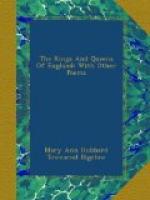On a midsummer’s eve she lay down to sleep,
Wearied and toil-worn the maiden was then;
How deep was that slumber, how quiet that rest,
’Twas the sleep from which no one awakens again.
Morn returned in its freshness, and flowers that she
loved
In beauty and fragrance were blooming around;
The birds caroled sweetly the whole live-long day,
But that strange mystic sleep all her senses had bound.
Day followed day until summer was gone,
And autumn still found her alone and asleep;
Stern winter soon followed, but its loud blasts and
shrill,
Were powerless to rouse her from slumber so deep.
Again spring returns, and all nature revives,
And birds fill the groves with their music again;
But the eyes and the ears of that loved one are closed,
And on her these rich treasures are lavished in vain.
Unheeded by her the winter snow falls,
Its beautiful garment spring puts on in vain;
Many summers the birds her sad requiem have
sung,
But to sound of sweet music she’ll ne’er
wake again.
There is but one voice that deep slumber can
break,
’Tis the same one that loudly called, “Lazarus,
come forth!”
At the sound of that voice all the dead shall arise,
And before God shall stand all the nations on earth.
Then shall this dear one, our first born, awake,
Her mortal put on immortality then;
And oh! blissful thought, that we once more may meet
In that home where’s no parting, death, sorrow,
or pain.
Weston, May 29, 1852.
TO A FRIEND IN THE CITY,
FROM HER FRIEND IN THE COUNTRY.
By especial request I take up my pen,
To write a few lines to my dear Mrs. N.;
And though nothing of depth she has right to expect;
Yet the will for the deed she will not
reject
The task, on reflection, is a heavy one quite,
As here in the country we’ve no news to write;
For what is to us very new, rich, and
rare,
To you in the city is stale and thread bare.
Should I write of Hungary, Kossuth, or the Swede,
They are all out of date, antiquated indeed.
I might ask you with me the New Forest to roam,
But it’s stript of its foliage, quite leafless
become;
N.P. Willis and rival have each had their day,
And of rappings and knockings there’s nought
new to say.
Yet do not mistake me, or think I would choose,
A home in the city, the country to lose;
The music of birds, with rich fruits and sweet flowers,
We all in the country lay claim to as ours.
A bird that’s imprisoned, I hate to hear sing,
Let me catch its glad note as it soars on the wing;
Its carol so sweet as it’s floating along,
It seems the Creator to praise in its song.
With the sweetest of poets I often exclaim,
“God made the country,”—let
the pride of man claim




